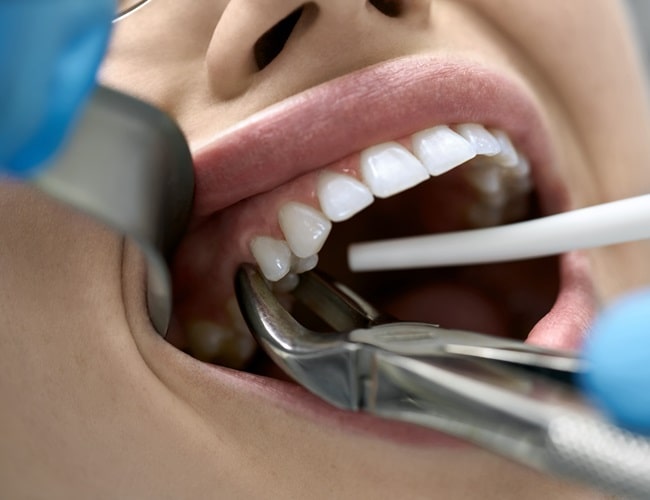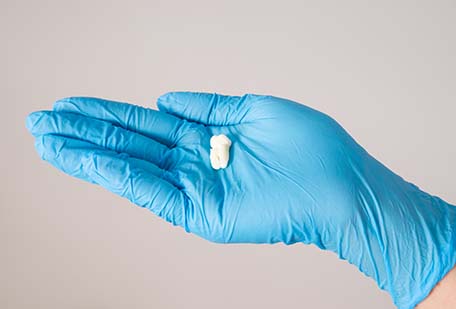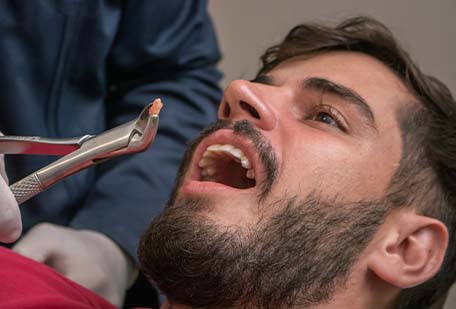Caulfeild Dental Centre
Wisdom Tooth Removal
Wisdom Tooth Removal in West Vancouver
Wisdom teeth removal is a common oral procedure. It involves the extraction of the third molars in the lower and upper jaw. These teeth erupt between 17 and 21 years of age, and most individuals have all four wisdom teeth. Extraction provides a preventative measure to protect teeth from future issues, preserving overall oral health.
Not everyone will need to get these teeth extracted. However, if you do, it can be done at any age. Dentists recommend wisdom teeth removal from the late teens to early twenties since wisdom teeth still form during this stage. They are easier to remove at this age, with a decreased risk for complications.
Am I a Candidate for Wisdom Tooth Removal?
As mentioned earlier, only some people require the removal of their wisdom teeth. If your teeth are healthy, adequately positioned, fully grown, and can be cleaned properly, you don’t need to remove them.
However, there are times when the teeth do not have adequate room in the mouth, which leads to complications. Erupting teeth can come in at various angles, sometimes even horizontally. Issues arise in the following situations:
- Teeth partially emerge through the gum line: This area is difficult to clean and see. Wisdom teeth that partially come in create a passageway for bacteria to enter. This can cause oral infection and gum disease.
- Teeth are hidden within the gums: If teeth aren’t emerging normally, they become impacted within the jaw. As a result, an infection can sometimes occur, or it can create a cyst that damages the roots of other teeth/bone support.
- Crown adjacent teeth: They can damage or crowd nearby teeth if there is not enough room.
Wisdom teeth may also require removal if the following issues occur:
- Constant infections from the soft tissue located behind the lower tooth
- Tumours
- Extensive amounts of tooth decay
- Gum disease
If you are still unsure about whether wisdom teeth extraction is the right treatment for you, consult a dentist to find out if you are a suitable candidate.
Why You Should Have Wisdom Tooth Removal
There are times when it is necessary to have a wisdom tooth removed. If left untreated, patients can be exposed to the following risks:
Infection
Infection (pericoronitis) becomes a predominant issue when there isn’t enough space for tooth eruption. Without sufficient room, the gum tissue surrounding the wisdom tooth is infected and irritated. This results in ongoing pain, problems with swallowing and/or biting, and swelling.
Overcrowding
When there isn’t adequate space for wisdom teeth to come in, existing teeth will shift to make room for the new tooth. As the tooth emerges through the gum line, the rest of the teeth move, causing them to overlap. Overcrowding is most common in the front of the mouth with the lower teeth.
When it comes to the molars, they tend to move outward or inward, misaligning the bite. While numerous factors can cause overcrowding, it can also happen if you have previously had braces.
Despite having braces, there may not be enough room in the mouth to accommodate wisdom teeth. Therefore, regular appointments become important. Through x-rays, your dentist can tell if there is adequate room for wisdom teeth and alert you early in the process whether an extraction is necessary.
Damage to Other Teeth
If there isn’t room to clean the tooth, the second molar may be negatively affected. This can cause many dental issues, including gum disease, decay, or bone loss surrounding the tooth.
Formation of Cysts
Impacted wisdom teeth can lead to the formation of cysts (fluid-filled balloons). They form inside the jaw and slowly expand, which destroys the adjacent jawbone and sometimes the teeth. It is challenging to treat cysts if the teeth are not removed while the patient is still a teenager.
It is best to have wisdom teeth removed early. As they develop, the jawbone becomes denser, and the roots grow longer. If the treatment is delayed, there is a higher rate of complications and a long post-operative course. Additionally, the recovery period is slower, and the rate of infection is also higher.
How We Conduct Wisdom Tooth Removal at Caulfeild Dental
If you feel anxious about wisdom teeth removal, you do not need to worry. At Caulfeild Dental, our wisdom teeth removal services are done under anesthesia for maximized comfort. Our staff is experienced, licensed, and trained in providing anesthesia, and are dedicated to ensuring your safety.
The day of the procedure involves taking medications which limit post-operative swelling and pain. We request that an adult or parent accompanies you into the office. They must stay with you the entire day.
Wisdom teeth removal procedures take thirty to sixty minutes. The entire time spent in the office is an hour and a half. Modern advancements in technology and medicine permit clients to experience a seamless procedure that promotes quick healing and minimal discomfort. Our infection control and up-to-date sterilization methods reduce infection as well.
Whether your appointment is in the morning or afternoon, you cannot eat or drink anything for a minimum of six hours before surgery. The only exception is prescription medications with a sip of water.
If your stomach contains any food, it increases the risk of complications with the anesthesia, which could cause vomiting and nausea. Procedures will require rescheduling if this is not followed.
At the consultation, we may provide a prescription for pain medication. This can be filled out before the appointment. While seated in the surgical room, our team will strive to make you comfortable and answer any questions you have on your mind.
When it comes to sedation, an IV is placed in the left arm. Local anesthesia, on the other hand, is provided after the surgery to ensure ongoing comfort and give enough time to go home and rest. You may experience sleepiness for most of the day, which is normal.
Things to Consider After Wisdom Tooth Removal
There are some important things to consider after surgery has taken place.
If you need stitches, they will not require removal, as they tend to dissolve within three to five days. You may also experience the feeling that your gums are swollen and pulling away from the teeth. This is part of the average recovery and goes away in a few days.
Anesthesia may last until the next day. Once it wears off, you may require pain medication. Try to first use anti-inflammatory and non-narcotic medication, like ibuprofen, to see if it adequately addresses pain. If it doesn’t, consume the prescription medication.
Our dentists in West Vancouver recommend beginning a post-operative diet consisting of clear liquids, like broth and jello. You can increase substances over time as your body allows.
Dairy products are not recommended on the day of surgery because they may cause vomiting and nausea after sedation. If antibiotics are provided, and you use birth control pills, be advised that they may become ineffective.
Choose Caulfeild Dental for Tooth Removal in Vancouver
At Caulfeild Dental, we care about your overall health. If you are concerned about your wisdom teeth, visit our dental clinic for a consultation, and we will assess your situation. Our experienced team can put your mind at ease and provide solutions you will be satisfied with.
Our expert technology can detect issues before problems arise, as we firmly believe in putting preventative measures in place. This reduces the potential for expensive and painful treatments down the road.
Located at 5311 Headland Drive, we can be found in the Caulfield Shopping Mall between The Valetor and Iris Optometrics and Opticians.
Wisdom Tooth Removal FAQs
Do I have to remove my wisdom teeth?
No, not necessarily. If your teeth are healthy, have come in normally, can be appropriately brushed, and don’t cause overcrowding, they don’t require extraction.
Is it painful to have them removed
During the procedure, you are under local sedation, so there is little pain. The only time there may be a bit of discomfort is when the anesthesia wears off. However, this can be managed with the help of either ibuprofen or pain medication.
General Inquiries
Looking for more information? Feel free to contact us and we will get back to you as soon as possible.
"*" indicates required fields
Accepting New Patients




